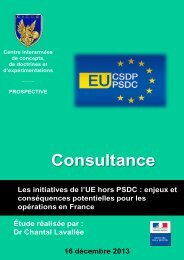Conference
science-research-bulletin-2013-conference
science-research-bulletin-2013-conference
Create successful ePaper yourself
Turn your PDF publications into a flip-book with our unique Google optimized e-Paper software.
EUROPEAN POLICE SCIENCE AND RESEARCH BULLETIN<br />
SPECIAL CONFERENCE EDITION<br />
MAPPING POLICE COOPERATION STRATEGIES<br />
IN THE EU AND AUSTRALIA: IMPROVING<br />
INTER-AGENCY UNDERSTANDING<br />
Saskia Hufnagel<br />
United Kingdom<br />
Keywords: Police Cooperation, EU, Australia, Federalism<br />
Abstract: This contribution presents both the EU and the Australian system of police cooperation<br />
in comparative socio-legal perspective and highlights some of the reasons why law-enforcement<br />
cooperation in the EU might, to some extent, be considered more advanced. The article also aims at<br />
answering the question whether EU police cooperation is today comparable to strategies employed in a<br />
federal system, such as Australia, or whether it is still closer to international cooperation.<br />
To find out about the structure of police<br />
cooperation in the EU this study employed a<br />
comparative socio-legal approach and juxtaposed<br />
both legal texts and practitioner attitudes in<br />
the area of law enforcement cooperation in<br />
the two systems. Interviews with practitioners<br />
were conducted with a view to investigating the<br />
extent of implementation of laws fostering police<br />
cooperation in the EU and Australia. It could be<br />
concluded that EU law-enforcement cooperation<br />
is distinctly different from both federal and<br />
international cooperation strategies. EU strategies<br />
are more formalised than Australian strategies<br />
as both bilateral and multilateral strategies<br />
between EU Member States have often been<br />
regulated at the supranational level. Compared<br />
to international cooperation, EU strategies are<br />
more far-reaching and go beyond international<br />
sovereignty concerns. What is most striking to<br />
learn in the comparative context is that the level<br />
of enthusiasm for cooperation (as measured by<br />
interview response rates) is much higher in the<br />
EU than in Australia. It follows that regulation of<br />
police cooperation, rather than having a strong<br />
legal effect, could be a major sociological factor<br />
impacting on practitioner enthusiasm.<br />
I. INTRODUCTION<br />
This article gives a brief summary of the author’s<br />
recently published comparative socio-legal<br />
study titled Policing Cooperation Across Borders —<br />
Comparative Perspectives on Law Enforcement within<br />
the EU and Australia (Hufnagel, 2013). It outlines<br />
the main new insights into police cooperation<br />
that can be gained from this analysis. Drawing<br />
on interviews with practitioners, a number of<br />
areas where the EU can be compared to a federal<br />
system are highlighted and the advantages and<br />
disadvantages of being a Union or a federation of<br />
states with a view to police cooperation practice<br />
are addressed. Particular topics that will be given<br />
attention are the evolution of legal frameworks<br />
regulating police cooperation, Joint Investigation<br />
Teams, Europol and regional cooperation.<br />
An important question to be asked in relation<br />
to EU police cooperation is whether it is<br />
today comparable to strategies employed in<br />
a federal state, such as Australia, or whether<br />
it is still closer to international cooperation.<br />
The short answer to this question is that EU<br />
law-enforcement cooperation is distinctly<br />
different from both federal and international<br />
cooperation strategies. With regard to federal,<br />
and specifically Australian, police cooperation,<br />
EU strategies are more formalised as both<br />
bilateral and multilateral strategies between EU<br />
114





